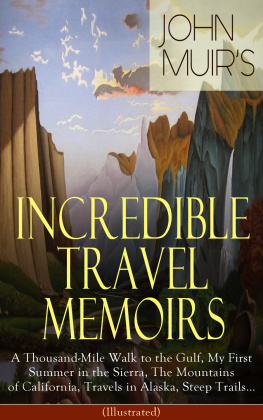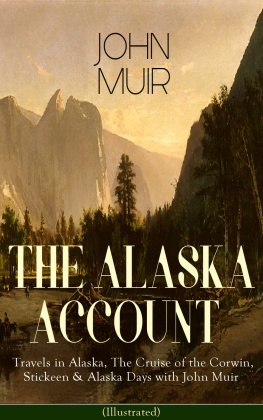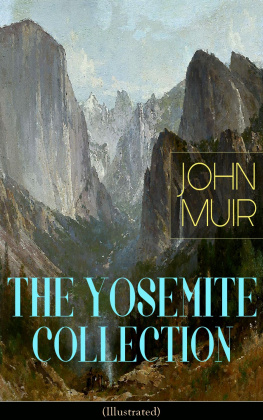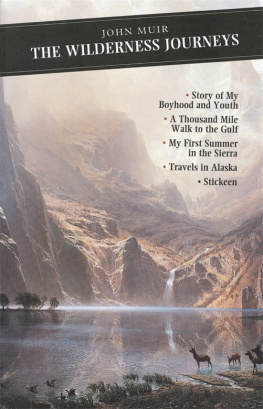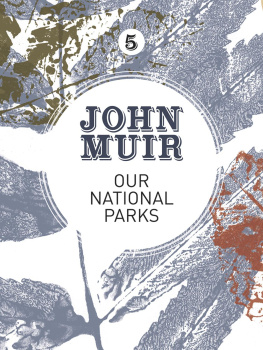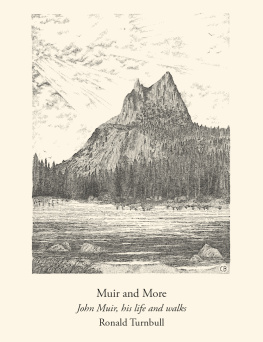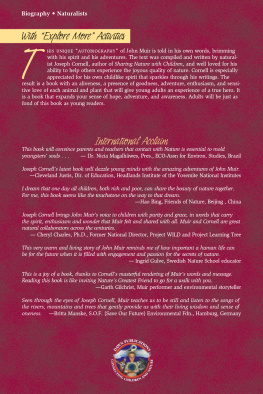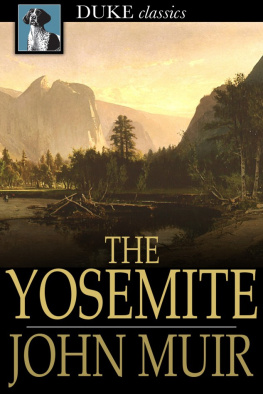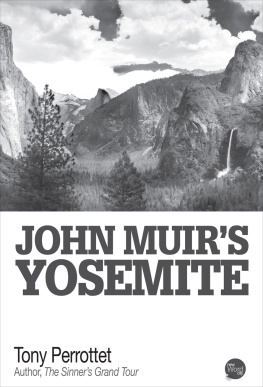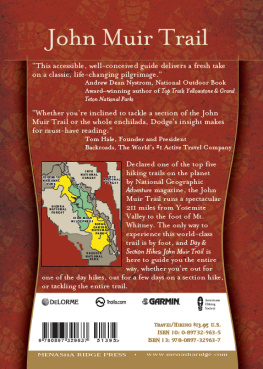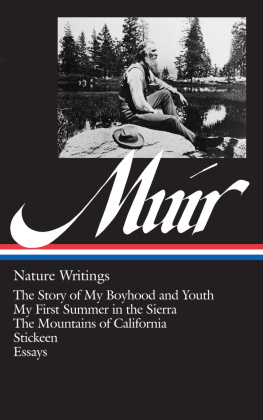John Muir - The Collected Works of John Muir: The Complete Works (Highlights of World Literature)
Here you can read online John Muir - The Collected Works of John Muir: The Complete Works (Highlights of World Literature) full text of the book (entire story) in english for free. Download pdf and epub, get meaning, cover and reviews about this ebook. year: 2015, publisher: PergamonMedia, genre: Home and family. Description of the work, (preface) as well as reviews are available. Best literature library LitArk.com created for fans of good reading and offers a wide selection of genres:
Romance novel
Science fiction
Adventure
Detective
Science
History
Home and family
Prose
Art
Politics
Computer
Non-fiction
Religion
Business
Children
Humor
Choose a favorite category and find really read worthwhile books. Enjoy immersion in the world of imagination, feel the emotions of the characters or learn something new for yourself, make an fascinating discovery.

- Book:The Collected Works of John Muir: The Complete Works (Highlights of World Literature)
- Author:
- Publisher:PergamonMedia
- Genre:
- Year:2015
- Rating:4 / 5
- Favourites:Add to favourites
- Your mark:
- 80
- 1
- 2
- 3
- 4
- 5
The Collected Works of John Muir: The Complete Works (Highlights of World Literature): summary, description and annotation
We offer to read an annotation, description, summary or preface (depends on what the author of the book "The Collected Works of John Muir: The Complete Works (Highlights of World Literature)" wrote himself). If you haven't found the necessary information about the book — write in the comments, we will try to find it.
The Collected Works of John Muir: The Complete Works (Highlights of World Literature) — read online for free the complete book (whole text) full work
Below is the text of the book, divided by pages. System saving the place of the last page read, allows you to conveniently read the book "The Collected Works of John Muir: The Complete Works (Highlights of World Literature)" online for free, without having to search again every time where you left off. Put a bookmark, and you can go to the page where you finished reading at any time.
Font size:
Interval:
Bookmark:
The Yosemite Falls, Yosemite National Park
THE SIERRA
BOSTON AND NEW YORK
HOUGHTON MIFFLIN COMPANY
1917
COPYRIGHT, 1911, BY JOHN MUIR
COPYRIGHT, 1916, BY HOUGHTON MIFFLIN COMPANY
ALL RIGHTS RESERVED
TO
FAITHFUL DEFENDER OF THE
PEOPLE'S PLAYGROUNDS
[Pg 3]
In the great Central Valley of California there are only two seasonsspring and summer. The spring begins with the first rainstorm, which usually falls in November. In a few months the wonderful flowery vegetation is in full bloom, and by the end of May it is dead and dry and crisp, as if every plant had been roasted in an oven.
Then the lolling, panting flocks and herds are driven to the high, cool, green pastures of the Sierra. I was longing for the mountains about this time, but money was scarce and I couldn't see how a bread supply was to be kept up. While I was anxiously brooding on the bread problem, so troublesome to wanderers, and trying to believe that I might learn to live like the wild animals, gleaning nourishment here and there from seeds, berries, etc., sauntering and climbing in joyful independence [Pg 4] of money or baggage, Mr. Delaney, a sheep-owner, for whom I had worked a few weeks, called on me, and offered to engage me to go with his shepherd and flock to the headwaters of the Merced and Tuolumne riversthe very region I had most in mind. I was in the mood to accept work of any kind that would take me into the mountains whose treasures I had tasted last summer in the Yosemite region. The flock, he explained, would be moved gradually higher through the successive forest belts as the snow melted, stopping for a few weeks at the best places we came to. These I thought would be good centers of observation from which I might be able to make many telling excursions within a radius of eight or ten miles of the camps to learn something of the plants, animals, and rocks; for he assured me that I should be left perfectly free to follow my studies. I judged, however, that I was in no way the right man for the place, and freely explained my shortcomings, confessing that I was wholly unacquainted with the topography of the upper mountains, the streams that would have to be crossed, and the wild sheep-eating animals, etc.; in short that, what with bears, coyotes, rivers, caons, and thorny, bewildering chaparral, I feared that half or more of his flock would be lost. Fortunately these shortcom [Pg 5] ings seemed insignificant to Mr. Delaney. The main thing, he said, was to have a man about the camp whom he could trust to see that the shepherd did his duty, and he assured me that the difficulties that seemed so formidable at a distance would vanish as we went on; encouraging me further by saying that the shepherd would do all the herding, that I could study plants and rocks and scenery as much as I liked, and that he would himself accompany us to the first main camp and make occasional visits to our higher ones to replenish our store of provisions and see how we prospered. Therefore I concluded to go, though still fearing, when I saw the silly sheep bouncing one by one through the narrow gate of the home corral to be counted, that of the two thousand and fifty many would never return.
I was fortunate in getting a fine St. Bernard dog for a companion. His master, a hunter with whom I was slightly acquainted, came to me as soon as he heard that I was going to spend the summer in the Sierra and begged me to take his favorite dog, Carlo, with me, for he feared that if he were compelled to stay all summer on the plains the fierce heat might be the death of him. "I think I can trust you to be kind to him," he said, "and I am sure he will be good to you. He knows all about the moun [Pg 6] tain animals, will guard the camp, assist in managing the sheep, and in every way be found able and faithful." Carlo knew we were talking about him, watched our faces, and listened so attentively that I fancied he understood us. Calling him by name, I asked him if he was willing to go with me. He looked me in the face with eyes expressing wonderful intelligence, then turned to his master, and after permission was given by a wave of the hand toward me and a farewell patting caress, he quietly followed me as if he perfectly understood all that had been said and had known me always.
June 3, 1869. This morning provisions, camp-kettles, blankets, plant-press, etc., were packed on two horses, the flock headed for the tawny foothills, and away we sauntered in a cloud of dust: Mr. Delaney, bony and tall, with sharply hacked profile like Don Quixote, leading the pack-horses, Billy, the proud shepherd, a Chinaman and a Digger Indian to assist in driving for the first few days in the brushy foothills, and myself with notebook tied to my belt.
The home ranch from which we set out is on the south side of the Tuolumne River near French Bar, where the foothills of metamorphic gold-bearing slates dip below the stratified deposits of the Central Valley. We had not gone [Pg 7] more than a mile before some of the old leaders of the flock showed by the eager, inquiring way they ran and looked ahead that they were thinking of the high pastures they had enjoyed last summer. Soon the whole flock seemed to be hopefully excited, the mothers calling their lambs, the lambs replying in tones wonderfully human, their fondly quavering calls interrupted now and then by hastily snatched mouthfuls of withered grass. Amid all this seeming babel of baas as they streamed over the hills every mother and child recognized each other's voice. In case a tired lamb, half asleep in the smothering dust, should fail to answer, its mother would come running back through the flock toward the spot whence its last response was heard, and refused to be comforted until she found it, the one of a thousand, though to our eyes and ears all seemed alike.
The flock traveled at the rate of about a mile an hour, outspread in the form of an irregular triangle, about a hundred yards wide at the base, and a hundred and fifty yards long, with a crooked, ever-changing point made up of the strongest foragers, called the "leaders," which, with the most active of those scattered along the ragged sides of the "main body," hastily explored nooks in the rocks and bushes for grass and leaves; the lambs and feeble old [Pg 8] mothers dawdling in the rear were called the "tail end."
Sheep in the Mountains
About noon the heat was hard to bear; the poor sheep panted pitifully and tried to stop in the shade of every tree they came to, while we gazed with eager longing through the dim burning glare toward the snowy mountains and streams, though not one was in sight. The landscape is only wavering foothills roughened here and there with bushes and trees and outcropping masses of slate. The trees, mostly the blue oak ( Quercus Douglasii ), are about thirty to forty feet high, with pale blue-green leaves and white bark, sparsely planted on the thinnest soil or in crevices of rocks beyond the reach of grass fires. The slates in many places rise abruptly through the tawny grass in sharp lichen-covered slabs like tombstones in deserted burying-grounds. With the exception of the oak and four or five species of manzanita and ceanothus, the vegetation of the foothills is mostly the same as that of the plains. I saw this region in the early spring, when it was a charming landscape garden full of birds and bees and flowers. Now the scorching weather makes everything dreary. The ground is full of cracks, lizards glide about on the rocks, and ants in amazing numbers, whose tiny sparks of life only burn the brighter with the heat, [Pg 9] fairly quiver with unquenchable energy as they run in long lines to fight and gather food. How it comes that they do not dry to a crisp in a few seconds' exposure to such sun-fire is marvelous. A few rattlesnakes lie coiled in out-of-the-way places, but are seldom seen. Magpies and crows, usually so noisy, are silent now, standing in mixed flocks on the ground beneath the best shade trees, with bills wide open and wings drooped, too breathless to speak; the quails also are trying to keep in the shade about the few tepid alkaline water-holes; cottontail rabbits are running from shade to shade among the ceanothus brush, and occasionally the long-eared hare is seen cantering gracefully across the wider openings.
Font size:
Interval:
Bookmark:
Similar books «The Collected Works of John Muir: The Complete Works (Highlights of World Literature)»
Look at similar books to The Collected Works of John Muir: The Complete Works (Highlights of World Literature). We have selected literature similar in name and meaning in the hope of providing readers with more options to find new, interesting, not yet read works.
Discussion, reviews of the book The Collected Works of John Muir: The Complete Works (Highlights of World Literature) and just readers' own opinions. Leave your comments, write what you think about the work, its meaning or the main characters. Specify what exactly you liked and what you didn't like, and why you think so.

